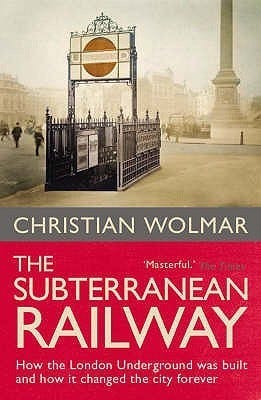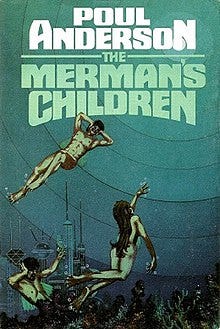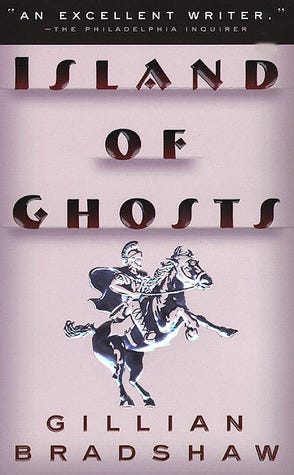Short Reviews for June 2023
Four more books
The Subterranean Railway, by Christian Wolmar (315 pp; 2004)
Who should read this? People who're interested in urban transit and want to read about its history.
This's an able history of the London Underground (or "Tube"), focusing on the period from 1860-1944 when it began and expanded, and when it famously sheltered Londoners during the war.
London was unique among world cities in having private investors who built underground railways even in the steam era - and then, multiple investors who built more underground railways in hopes of profit from commuters and other travelers. Economically, they failed; most investors got negligible dividends if any, and none of them made back their money. But, in the era before the internal combustion engine, the pitches were plausible. Thousands of passengers rode each line (each line being managed individually; passengers couldn't transfer). They benefitted London by enabling much more development, some of which the railways recaptured by selling houses themselves.
And then came the internal combustion engine. Tube revenue - which had been covering costs and maintenance, if not making back the initial construction costs - plummeted. As in almost all cities with urban railroads, a government agency was formed to take them over. But unlike most other cities, London already had a quite substantial underground rail network that (despite decades of bad maintenance) persisted through government management.
The other thing that I was chewing on after reading this book (besides this fortuitous story) is the historically contingent nature of public transportation. While in Boston recently, I was riding the "T" (their subway) and grumbling at how badly maintained it is. But this book makes me realize that good train lines don't just happen. It takes not just designers but builders and managers and maintenance workers. Usually, that takes some personal incentive. Here (for London) it was hopes of profit. As Wolmar explains, that had already failed by the 1930's. Since then, the incentives have usually been political. As she tells in her story of bad maintenance under government management, these can prove elusive - I saw the same thing in Boston, where loudly-trumpeted improvement programs had turned out very different in practice. Sadly, the abstract sense of the public good isn't enough.
Apollo: The Race to the Moon, by Charles Murray and Catherine Bly Cox (512 pp; 1989)
Who should read this? People who like engaging stories of logistics and details.
This's the tale of the Apollo program, focusing not on the astronauts or the political winds but on Mission Control - the logistics and processes of designing the spacecraft and directing the missions. As the authors say in the afterword, the tale of the astronauts has been told often; they wanted to tell this adjacent but more-overlooked tale.
It's a tale well worth telling, and I enjoyed it a lot. I hadn't realized how vital the culture and skill of Mission Control was to the Apollo program, or how difficult it was to build. The spacecraft were, essentially, designed and built by hand. Computers existed, but they were so rudimentary that they couldn't be used in Mission Control. They were complicated systems whose quirks needed to be learned by heart so controllers could immediately respond in unanticipated conditions. For example, as the Apollo 11 lunar module was about to land on the moon, its computer memory overflowed. Mission Control saw the alarm, recognized it, and made a gut call that things were okay to continue. Or, as Apollo 12 was taking off, it was hit by lightning. Mission Control smoothly made a gut call to restart the spacecraft's computer. Both times, everything worked.
These gut calls, of course, were made thanks to months of intense study (there wasn't time for more, with the rushed schedule of the whole Apollo program) of every detail of the system, and involved simulations of all sorts of problems. That system of intense training and simulation was what got the astronauts safely to the moon and back.
This goes to show more of the unsung details around the stories we remember from history, and how so many seeming protagonists were dependent on other people and institutions who were the protagonists of their own stories. Like the authors in the afterword, I only regretted that this book couldn't have been longer.
The Merman's Children, by Poul Anderson (319 pp; 1979)
Who should read this? People who like interesting fantasy what-if’s and worldbuilding.
There's a settlement of merpeople off the Danish coast, and they're tempting good Christian people to join in their revelries. In fact, one woman was living with them for a while and had children with them. The new Archdeacon is disturbed and wants to exorcize them. And that's the premise.
This book, Anderson says, is set in a Catholic universe - but not the universe of St. Thomas Aquinas; the universe as seen by an Early Medieval villager. Merpeople have reason but no souls; exorcism does drive them away... and because of things like that, "half-world" creatures like them are finding fewer and fewer places in the world. Anderson's up-front with this premise; I was surprised but very interested.
There are adventures - we follow the merpeople as they search for a new home through the Atlantic and Mediterranean coasts, considering Greenland and America as well as Europe. Meanwhile, some of the half-human merpeople try to find a place in human society. But the focus keeps coming back to Anderson's metaphysical premise. If you're just looking for an adventure story, I recommend going elsewhere.
But, this premise is fascinating worldbuilding that could be explored at epic length. On the one hand, it feels uncomfortable to me - both as a Christian myself, and just as a modern reader - that a world could be designed so that characters as multidimensional and seemingly human as the merpeople could lack souls. We see when one of them is baptized, she doesn't just develop in character - her old memories and personality vanish! I as a modern reader am very unsatisfied; the archdeacon who's watching is intellectually happy (unsurprisingly), but most of the other characters agree with me this feels wrong. On the other hand, this sort of discomfort could be a premise leading to a great epic tale wrestling with that and coming to a conclusion more emotionally satisfying to the reader.
Anderson... sort of does that. He tells a tale, if not at epic length. He reaches a tentative settlement. His characters do end the book having found a life for themselves, happy if not completely satisfied. Similarly, I'm mostly happy with the ending, but I'm not really satisfied. We've toured through Anderson's world and seen the consequences of its setup played out, but we don't get high-level enough to see why any of this is the case. Our characters move around at ground level (as it were) within their world; they don't get to see why it was set up that way. So I enjoyed this book, but I'm wishing it was more.
Island of Ghosts, by Gillian Bradshaw (384 pp; 1998)
Who should read this? People who like historical drama both psychological and external.
In this historical novel set in the Roman Empire, our protagonist is one of the commanders of the Sarmatians who originally fought against the Romans before Emperor Marcus Aurelius defeated them and, as part of the peace treaty, recruited some of them as auxiliaries to serve in Britain. The plot revolves around his navigating the calls of honor and duty to Rome (to which he and the others have sworn an oath), both for himself and for his own troops and for his fellow Sarmartian commanders.
He himself is willing to meet the Romans halfway (such as by working within their logistics system to get better horse feed), despite some of the other Sarmartians accusing him of Romanizing. And (as he finally admits partway through the book), that isn't totally wrong - he's tired of war and welcomes the chance to establish a peaceful life in Britain. But he can't admit this, or he'll lose any respect from or influence with his fellow Sarmatians.
Amid this, a conspiracy broils to establish an independent British kingdom. The conspirators are happy to recruit Sarmartians impatient with Roman civilization to fight together for a more tribal society more familiar to them. Our protagonist, both bound by his oath to Rome and finding himself disquieted by the idea of tearing down Roman civilization, must figure out how to act amid this and also how to handle his fellow Samartians who feel quite differently.
Bradshaw, like always, has done her research here and gives a very vivid portrait of Roman and Samartian life. The culture clash is also well done, as are so many of the characters. This's what every historical novel should be trying to be.






I do enjoy your book reviews. I was surprised to discover that Charles Murray wrote the Apollo book. This is the same Murray who was co-author of the Bell Curve and wrote several controversial socio-political books since then.
I can't decide about the Poul Anderson book. I read a lot of SF, but I've never liked Poul Anderson, although I can't remember what I have disliked about his books. From your description, the universe sounds kind of intriguing but maybe also dissatisfying.
I do enjoy your book reviews. I was surprised to discover that Charles Murray wrote the Apollo book. This is the same Murray who was co-author of the Bell Curve and wrote several controversial socio-political books since then.
I can't decide about the Poul Anderson book. I read a lot of SF, but I've never liked Poul Anderson, although I can't remember what I have disliked about his books. From your description, the universe sounds kind of intriguing but maybe also dissatisfying.